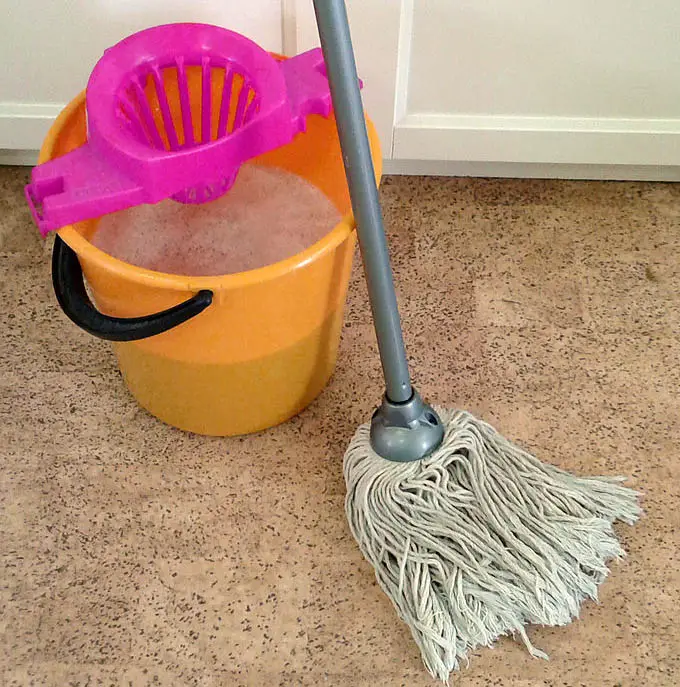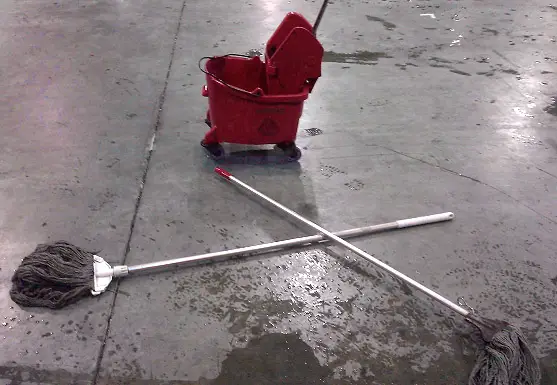Ever looked at your dirty floors and thought, “Maybe I can just use some dish soap?” It’s a thought everyone has had at some point. After all, dish soap does a great job of cleaning greasy dishes, so why not tackle grime on the floor? While it might seem like a simple solution, there are some things you need to know before using dish soap on your floors.

Image: homeclasp.com
We’re diving deep into the world of dish soap mopping. We’ll explore the pros and cons, the different types of floor surfaces, and how to clean effectively and safely. By the end, you’ll have the confidence to make the right decision for your floors and your home.
The Allure of Dish Soap: A Quick and Convenient Option
The allure of using dish soap on your floors is understandable. It’s readily available and often a more affordable option than specialized floor cleaners. Plus, for some people, it just feels like the right thing to do. But is it actually the best choice?
When Dish Soap Might Work:
Let’s be honest, sometimes dish soap can be a viable solution for a quick clean. It’s particularly helpful when you’re faced with sticky messes, light dirt, or simply need to give your floors a quick spruce up. Dish soap’s grease-cutting properties can effectively break down sticky residues like spilled juice or food.
The Potential Pitfalls of Dish Soap on Floors:
While dish soap can seem like a convenient shortcut, it isn’t always the ideal cleaning solution for your floors.
1. Stripping Away Essential Protection:
Many floor surfaces, especially wood floors, have a protective finish to safeguard them from scratches, stains, and everyday wear. Dish soap, with its powerful grease-cutting capabilities, can actually strip away these protective finishes, leaving your floors vulnerable. Imagine it like this: if you were to wash your hair with dish soap, it would strip away the natural oils, leaving it dry and brittle. The same principle applies to your floors.
2. Unwanted Residue:
While dish soap may seem to disappear when you rinse it away, some residues can linger, especially if you don’t use enough water. Over time, these residues can attract dirt and grime, making your floors look dull and even sticky. Not what you want after all that cleaning effort!
3. Damaged Floor Finishes:
Certain floor finishes, such as certain waxes and polishes, can be easily damaged by dish soap. They can become cloudy or even peel away, leaving your floors looking uneven.
4. The Risk of Slippery Surfaces:
Dish soap can also make your floors slippery, increasing the risk of falls. It’s especially important to consider this if you have children or elderly individuals living in your home.

Image: homeclasp.com
Navigating the World of Dish Soap: Floor Types to Consider
Now that we’ve covered the potential downsides, let’s dive into the specifics of different floor types. It’s crucial to know how each floor reacts to dish soap:
1. Hardwood Floors:
Hardwood floors are known for their durability and elegance but can be sensitive to harsh chemicals. While you can use dish soap sparingly on a hardwood floor with a sealant, it’s generally best to err on the side of caution. The safest approach is to use a cleaner specifically formulated for hardwood floors.
2. Tile Floors:
Tile floors are generally more resilient than hardwood floors. They are also easier to clean as they are porous. However, it’s essential to know what type of grout you have. Certain grout types can be sensitive to harsh cleaning agents.
3. Laminate Floors:
Laminate floors are designed to mimic the look of hardwood but can be susceptible to damaging chemicals. It’s best to avoid using dish soap on laminate floors. Always consult the manufacturer’s cleaning recommendations for your specific laminate flooring.
4. Vinyl Floors:
Vinyl floors are known for their durability and water resistance, but they do have their limitations. Vinyl flooring can be stripped of its shine if you use dish soap.
Making the Right Cleaning Choice for Your Floors: A Safe and Effective Approach
We understand that dealing with dirt and grime can be frustrating, but there are better alternatives than using dish soap.
-
Invest in a quality floor cleaner specifically formulated for your floor type. This will ensure that you’re cleaning effectively and safely without damaging your floor’s finish.
-
Read the instructions carefully and use the right dilution. Too much cleaner can be as damaging as too little.
-
Always test any new cleaner on a small, inconspicuous area of your floor before applying it to the entire surface.
-
Never use harsh chemicals on your floors without first consulting the cleaning instructions for your specific flooring.
Expert Insights:
“Sometimes the best approach to cleaning is the simplest approach: use a mild cleaner for your floor type, and be sure to wring out the mop before applying it to the floor. Don’t be afraid to ask for advice from a professional cleaner or flooring specialist if you have any questions or concerns,” says [expert name], a certified cleaning professional.
Can I Use Dish Soap To Mop The Floor
Final Thoughts:
While dish soap might seem like a quick fix for dirty floors, it’s not always the safest or most effective cleaning solution. By understanding the properties of dish soap, the different types of floor finishes, and the importance of choosing the right cleaning products, you can keep your floors clean and beautiful for years to come.
Have you used dish soap on your floors? Share your experiences in the comments below!






